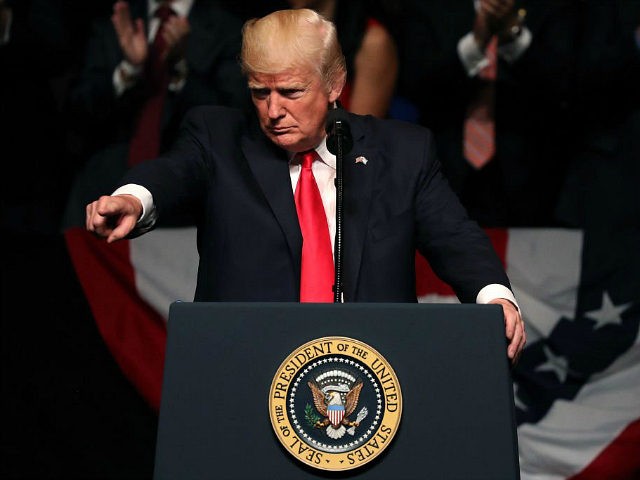In a heart-wrenching address to the Cuban exile community, President Donald Trump announced in Miami Friday a reversal of Obama-era policy that significantly emboldened the Castro regime.
President Trump could have merely offered some platitudes about the value of freedom, the futility of communism, and some notes on the new policy. Instead, he meticulously listed discrete crimes committed against the Cuban people.
He gave the stage to former political prisoners, dissidents, freedom fighters wronged by the Castro regime. Trump bowed his head before the suffering of the children torn from their parents under Operation Peter Pan, welcomed a standing ovation for Ladies in White leader Berta Soler, and vowed to the families of those killed in the 1996 Brothers to the Rescue incident that their loved ones “did not die in vain.”
This last deferential move to the suffering of the Cuban exile community in America served not only to emphasize the care with which President Trump has studied the history of the Cuban Revolution, but to remind the audience of what could have been: a Hillary Clinton presidency that would have put the man who allowed the Brothers to the Rescue incident go unpunished back in the White House.
Brothers to the Rescue is a humanitarian group run by Cuban-Americans dedicated to rescuing refugees lost at sea attempting to reach America. This was a particularly common problem in the early-to-mid 1990s, following a Castro regime policy change that encouraged Cubans to risk their lives trying to make it to Florida on whatever makeshift rafts and vehicles they could create.
On February 24, 1996, volunteers Carlos Costa, Armando Alejandre, Mario de la Peña, and Pablo Morales embarked on a mission to scout for lost Cubans in international waters, where they were permitted to fly by international law. Cuban military planes shot them down, killing them all. All four were U.S. citizens.
The incident occurred during the Bill Clinton presidency, a particularly violent and horrifying time for the Cuban exile community due to Clinton’s permissive policies towards the regime and use of force against the law-abiding Cuban-American community. Clinton asserted that the murder of U.S. citizens would “not be tolerated” before proceeding to tolerate it. While liberal media at the time alleged that Clinton was considering military action, Washington had no response to the attack, returning to its see no evil, hear no evil Cuba policy until the day came to deport Elián González.
Only one person was ever held accountable for the deaths of these four Americans: Gerardo Hernández, a spy for the Cuban regime who had been operating in Florida. Hernández reportedly provided the intelligence that made the murder possible. He was not charged with murder, but “conspiracy,” and freed during the term of President Barack Obama as part of a trade for U.S. citizen Alan Gross. The families of the Brothers to the Rescue victims, ignored throughout the Clinton era, called Obama’s move a “slap in the face.”
Long forgotten, three representatives of the families of these men – Mario and Miriam de la Peña and Mirta Méndez – stood alongside President Donald Trump Friday to listen to the president announce a radical shift in policy that would hold the military who killed their loved ones accountable.
Trump mentioned them by name during his speech, along with a number of former political prisoners and victims of the communist regime who had long remained footnotes in the mainstream dialogue surrounding Cuba: names like Berta Soler and Antúnez, both invited to the event, and like the victims of the Brothers to the Rescue attack.
In doing so, he issued not only a harsh rebuke of the communist Castro dynasty but of the complacent Democrats that have emboldened it, the leftists in the media who have empowered it, and the thankfully fictional Hillary Clinton administration who would have kept their nearly six-decade-old idleness strong.

COMMENTS
Please let us know if you're having issues with commenting.